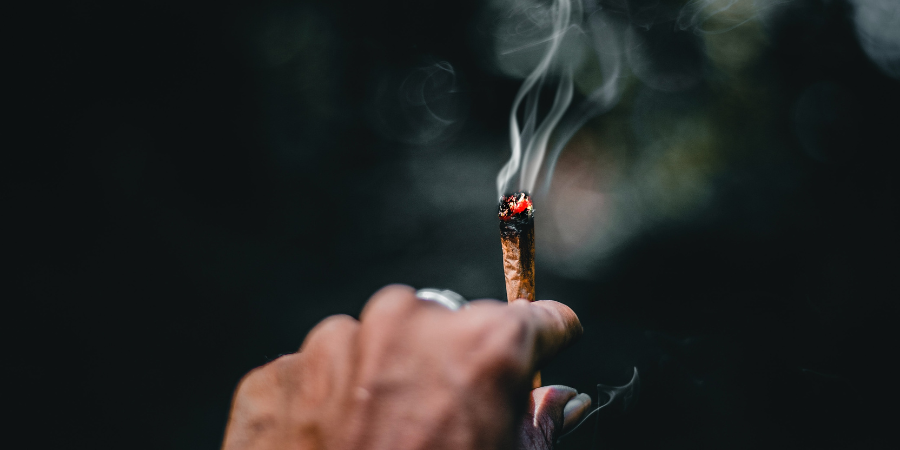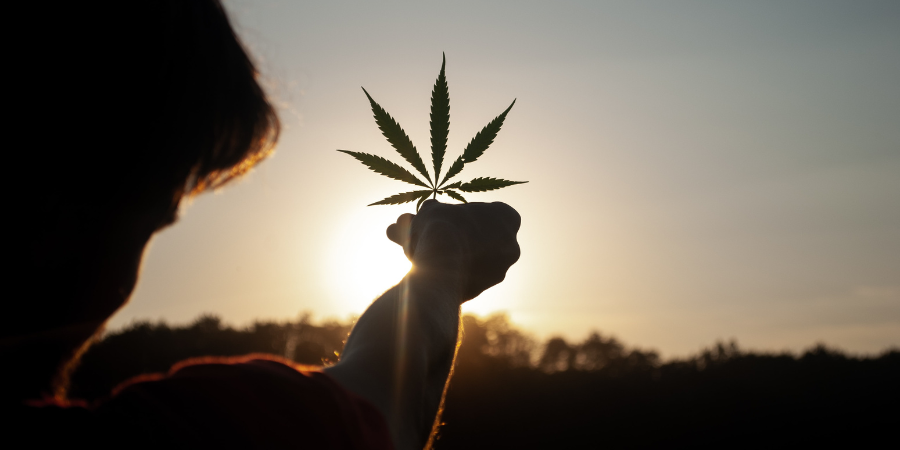
Written by:

Medically Reviewed by:
Last Updated:
March 5th, 2025
Cannabis Addiction | Definition, Symptoms and Effects
Cannabis addiction spans across all ages and social classes, with 7.8% of people aged between sixteen to fifty-nine having used the drug. Being the most commonly used drug in the UK, and with ever-increasing societal acceptance, more and more people are experiencing the negative side effects of cannabis addiction every day.
On this page, we will look at the signs, symptoms and effects of cannabis addiction, as well as how to help a loved one in trouble.

What is cannabis?
Cannabis is a naturally occurring drug made from the cannabis plant. It contains the psychoactive cannabinoid THC (delta-9-tetrahydrocannabinol) and the non-psychoactive cannabinoid CBD (cannabidiol).
The flowers and leaves of the cannabis plant are dried and are then smoked by the user or consumed as food. It is known under a variety of different names, including weed, pot, marijuana, bud, dope, grass, ganja, and skunk.
There are also a number of distinct strains of cannabis, ranging in potency. Producers of cannabis will “breed” plants to create hybrids with selected characteristics and varying highs. The strain will be named according to its look, taste, and effects, for example, Purple Haze, Lemon Kush, or Blue Dream.
Signs of cannabis addiction
Cannabis is considered as both a depressant and stimulant. It can cause you to feel relaxed and sleepy, and you may also become very aware of your senses and feel as though time is slowing down. As well as this, you may experience feelings of pleasant euphoria, laughing, and being talkative.
Many people, however, also react negatively to cannabis, facing hallucinations, delusions and feelings of anxiety and paranoia. Those with a family history of mental illness are more likely to suffer negative side effects after cannabis use – studies have shown that mental illnesses are diagnosed five times more frequently in people who had used cannabis than in those who hadn’t.
Short-term effects of cannabis abuse
- Feeling lightheaded or faint
- Dry mouth
- Nausea
- Red or bloodshot eyes
- Increased appetite
- Difficulty concentrating
- Lacking motivation
- Increased blood pressure and heart rate
Long-term effects of cannabis abuse
- Respiratory infections and pneumonia
- Persistent cough
- Poor memory
- Distorted perception
- Psychotic disorders, including schizophrenia
- Issues with child development during and after pregnancy
- Cannabis hyperemesis syndrome (CHS) – episodes of nausea, vomiting, dehydration and abdominal pain
There is also a significant correlation between the use of cannabis and the risk of car accidents as cannabis reduces cognitive and psychomotor abilities in the user.
The widespread use of cannabis pervades the younger generation too, with a staggering 18.7% of sixteen to twenty-four year olds using the drug. Its popularity amongst adolescents poses troubling risks to their brain development, and can result in cognitive impairment and increased feelings of depression and anxiety.
Is cannabis addictive?
Cannabis is classified as an addictive drug, with studies showing that three in ten people will develop a cannabis abuse disorder and dependency after frequent use. Those who begin using the drug before the age of eighteen are four to seven times more likely to become addicted.
A person’s mental health plays a large role in their chances of becoming addicted, as well as genetic and environmental factors. Cannabis can seem appealing to sufferers of anxiety, depression, PTSD, and schizophrenia, as it may offer temporary relief from symptoms. However, once the effects of cannabis have worn off, the mental health symptoms that the user was attempting to quell quickly come back tenfold.
As with many other drugs, cannabis affects neurotransmitters in the brain – notably dopamine. This stimulates your reward system and in turn motivates you to consume more of the drug. With prolonged exposure to cannabis, your brain’s natural dopamine levels begin to reduce and you are left needing higher doses of the drug just to feel normal.
Withdrawal symptoms are experienced in users with a dependency to cannabis, making it difficult to quit. These symptoms can manifest in a variety of ways, including:
- Irritability and mood swings
- Insomnia and restlessness
- Decreased appetite
- Cravings
- Other forms of physical discomfort
Signs of cannabis addiction
It is important to recognise the signs of cannabis addiction and be able to spot them in yourself or a loved one. Although many users hide their addiction well, there are some telling signs to look out for, including:
- Continued use of cannabis despite its negative side effects
- Craving cannabis and constantly thinking about obtaining it
- Developing a tolerance and needing higher doses to feel its effects
- Loss of interest in formerly enjoyed activities
- Inability to keep up with responsibilities and commitments
- Deteriorating relationships or career
- Engaging in risky behaviours whilst using cannabis
Being honest with yourself about your marijuana addiction is often the first step toward recovery. If you can relate to any of the points on this page, it is an indication that your drug use may be going too far.
Five things to know about cannabis
- Cannabis is a class B drug – you may risk five years imprisonment for possession, and 14 years imprisonment for supplying in the UK.
- Being caught with cannabis could restrict the jobs you apply for in future, or the countries you can visit.
- Cannabis is popular amongst young people, with 31% of seventeen-year-olds having tried cannabis.
- The potency of cannabis has tripled since 1994, with the quantity of THC continuing to rise.
- Cannabis impairs short-term memory which can limit performance at work or school.
Helping a loved one with cannabis addiction
Approaching a loved one and talking about their cannabis addiction can often be worrisome – it is sometimes very difficult to know what to say or do. Most importantly, you should avoid blaming them for their drug addiction, and always come from a place of love. Remind them of interests, hobbies, or dreams that they have likely given up on, and offer them your support.
If they are not quite ready to seek treatment, avoid getting angry. Instead, set boundaries and let them know that you will be there for them when they need you. Forcing an addict into treatment will not work – they must come to the realisation that they have a problem if they are to have a successful recovery.
What are the next steps?
There are many misconceptions surrounding cannabis, and consequently, users may downplay their drug use, or be unaware of the risks entirely. However, if cannabis has negatively impacted any aspect of your life, including work, school, relationships, finances, or your health, our team of dedicated professionals are here to provide you with effective cannabis addiction treatment.





